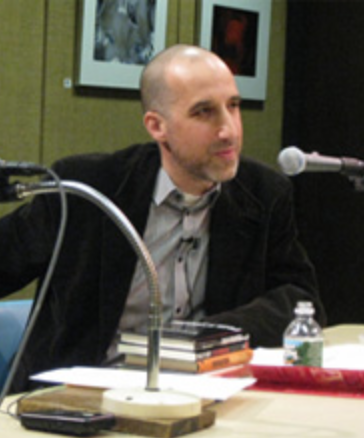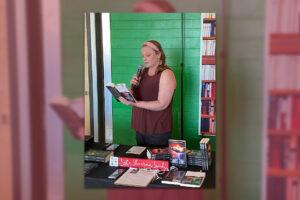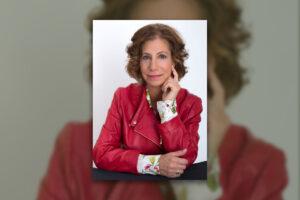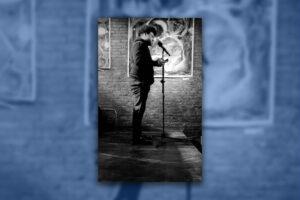By Octavia Findley
On Monday, November 19, I met with Ed Schwarzschild for an interview.
Octavia Findley: Can you describe your craft for me?
Schwarzschild: I’m a fiction writer. I write novels and short stories. I also write non-fiction. Most of the time, I think of myself as someone writing literary fiction. My first novel’s central character is a con man, so that book has a bit of a crime element to it. The novel I’ve just finished takes place in an airport, so there’s a thriller element to it. Still, I continue to think of my main work as literary fiction. I want to write stories, novels, and essays that people want to read and want to keep reading. I hope there is excitement and tension of some kind in everything I write.
OF: What’s your favorite part of the writing process?
ES: I love it when it’s going well; that’s the best part. When you’re completely immersed in the project, you’re thinking about it even when you’re not at your desk. You’re getting ideas and writing down notes. You can feel how alive what you’re working on is. I also like the revision process. I love revising. There’s something really rewarding about having a draft that’s complete and that you can polish and hone, making it better and better. But I think the key is to find a way to enjoy every part of the process, even the hard parts. To find the difficult parts familiar, to find what’s pleasurable about the parts that drive you crazy. If you can find a way to enjoy the whole process – and that’s something that I still struggle with – then you’re in very good shape. I think I’m doing that more – being grateful that I get to do this kind of work. It’s good to remember how fortunate we are to be able to write. To be able to sit, think, build a world and try to make other people interested in it.
OF: What’s your greatest influence as an author?
ES: That’s one of those impossible questions; on some level, the answer changes week to week. I’ve been reading for a long time and I’m always influenced by the work I like, and sometimes by the work I don’t like. I’ve been fortunate to have great teachers over the years and I’ve been fortunate to be in the room with great writers over the years. Some of the writers who have been crucial for me include Tobias Wolff, who was someone that I read for a long time, and then he was my teacher at Stanford for a couple of years. Reading Grace Paley and Phillips Roth was transformational for me. Roth’s voice and Paley’s voice really got me excited about the possibilities of what writing could do. The writers that I’ve been in workshop with over the years have probably been more influential than anyone, people like Adam Johnson, Julie Orringer, Chris Castellani, and others. And then, earlier this semester, Nana Kwame Adjei-Brenyah was here at UAlbany – he was an undergrad here. He studied with me a few years ago and now he’s someone who influences me. His first book, Friday Black,is absolutely fantastic, and it was inspiring to be in his presence and spend time talking with him. I’m inspired by my students, all the time, even the ones that don’t wind up with books reviewed in the New York Times.
OF: What’s your favorite genre for leisure reading?
ES: Lately, I’ve been working on a novel that has a connection to World War I, so histories of World War I feel like my favorite genre these days. But I’ve also been reading some multi-volume novels the last few months. Elena Ferrante’s Neapolitan novels, for instance. And I’m almost done with Edward St. Aubyn’s Patrick Melrose novels. St. Aubyn’s an incredible stylist, inspiring sentence after sentence. And there’s a stack of books I want to read next. If I look at that stack, it’s hard to say what my favorite genre is. There are all kinds of books in that stack.
OF: Would you like your novels to be made into a film?
ES: Who wouldn’t like their work to be made into a film, big or small? I think all writers would be excited to see how their work gets adapted in any way, whether it’s translated into another language, adapted for the stage, or made into a film. I think it’s really exciting for any writer to see another artist moved by the work and inspired to make something based on that work. It doesn’t have to be a big Hollywood movie with giant stars. It’s exciting anytime you see someone connect with your book. When someone reads the book and loves it, that’s a big win. When someone reads the book and loves it and wants to make something out of it, it’s super exciting. But it doesn’t happen that often. I don’t think you can sit down at your desk thinking, ‘I’m going to write a book that’s going to become a movie.’ That’s a long road of frustration, probably. Still, if any film people are reading this, I’d like to point out that my books are very cinematic.
OF: Do you have any advice for beginning authors?
ES: I have the advice that every writer has, but it’s true: ‘You have to read all the time.’ When I was writing about the con man in my first novel, I was reading about salesman culture and the motto I frequently came across was, ‘Always be closing.’ That’s a line that you’ll hear a lot when you’re in sales. Maybe for writers, it’s, ‘Always be reading.’ I remember Junot Díaz visited the New York State Writers Institute here on campus a few years back and one of the students asked him about endings. “Endings are so hard to write,” the student said. “How do you learn how to write good endings?” “To answer that question,” Díaz said, “you read four thousand endings. And then you’ll have a lot of ideas about how to write good endings.” I think the same advice holds true for beginnings and middles and endings. You have to be a student of literature; you have to be reading all the time. Or, to paraphrase Henry James: “To be a writer is to be someone upon whom nothing is lost.” When they’re not busy reading, writers can get a lot from paying attention to the world around them, finding inspiration and material in what happens everyday. There’s material around us all the time. We don’t pause often enough to pay attention to it. That’s something that writers need to do and something young writers need to learn how to do, whether it’s by keeping a journal or writing notes on scraps of paper or dictating voice memos into your phone. Getting away from screens is better than getting immersed in screens, but that’s my own bias. No matter how you do it, paying attention to the world around you is a great tool for any young writer.
Despite this author’s claim that he has the same advice as every other writer he presented it to me in a way that I had not heard before and was interesting and unique. I am honored that I got the opportunity to interview this author and educator. Among his publications are Responsible Men, a novel, and The Family Diamond, a collection of stories.More information about his work can be found here:http://www.edwardschwarzschild.com/index.html





